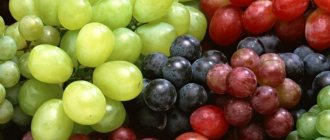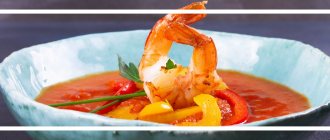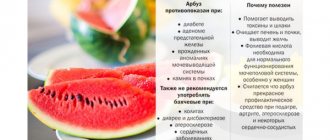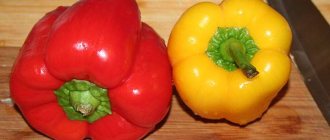Properties of grapes
Grapes are a favorite natural delicacy of many people. It contains many substances beneficial to humans. Grapes contain very rare components that have healing properties.
- Grapes contain the most valuable substance - fructose, which serves as a source of vital energy.
- There are many organic acids, the value of which lies in their antiseptic properties.
- The berries of the fruit contain a lot of pectin, which can cleanse the body and remove dangerous toxins, heavy metals, and bad cholesterol. And if we make reference to the difficult environmental situation, then the product serves as a real salvation for people.
- Flavonoids stop the growth of dangerous cells, thereby slowing down the development of tumors. The substances improve the condition of blood vessels, making them strong and elastic.
- Microelements: potassium maintains water balance, helps the heart function, magnesium calms and dilates blood vessels, calcium normalizes the condition of the skeletal system.
Listing these advantages of grapes, it is difficult to assume that they can have a negative effect on the body. After all, it contains a huge amount of vitamins and minerals.
Its chemical composition has no place at all for substances harmful to humans.
Chemical composition
Per 100 g of product, grapes contain: proteins - 0.7 g, fats - 0.2 g, carbohydrates - 18.1 g. And the calorie content does not exceed 69 kcal. The vitamin group is represented by such substances as:
- thiamine;
- niacin;
- riboflavin;
- pantothenic acid;
- pyridoxine;
- folic and ascorbic acid.
The long list of microelements includes substances such as: calcium, iron, potassium, manganese, magnesium, potassium, zinc and other components.
This composition contains all the components that can have a positive effect on strengthening the immune system, the cardiovascular system, lowering cholesterol, improving the blood count, reducing stress, improving metabolic processes, and enhancing brain activity. All this would be wonderful if not for one big “BUT”.
Contraindications
The skin of grapes contains sterols, alcohols, fatty acids, and grape seeds are a source of such components as: solid fatty oil, tannins. All these components have a pronounced property of irritation for the internal mucous membranes of the stomach, as they have a pronounced acidic character.
The grapes remain in the stomach for about 30 minutes after consumption, then all its substances are gradually absorbed into the intestines.
However, grapes, unlike other foods, are poorly digested, so fermentation processes begin. It is these negative processes that cause phenomena such as bloating, flatulence, and a feeling of discomfort in the digestive organs. For this reason, when patients complain about unstable functioning of the digestive organs, grapes fall into the category of prohibited foods.
Erosion that occurs on the surface lining of the stomach requires urgent treatment. It is aimed at immediately reducing the level of hydrochloric acid, and grapes can not only reduce the effectiveness of medications, but also have the most negative effect on erosions and ulcers.
Is it possible to eat grapes if you have stomach erosion?
Erosions are shallow defects in the mucosa, which, with timely treatment, heal quickly and do not leave scars. With parallel drug treatment of erosions, it is important to adhere to a strict diet, which should contain foods that do not irritate the mucous membrane, do not cause strong secretion of gastric juice and are easily digestible.
Since grapes promote the release of acid and are poorly digested in the stomach, it becomes clear that in case of erosion one should avoid eating grapes, which can cause even more severe damage to the mucous membrane and worsen the disease.
Eating grapes
The rules of the diet are dictated by such a common pathology as increased acidity of gastric juice. Grapes of sour varieties will certainly increase acidity, which will worsen the general condition of a person with gastritis. Just one bunch is enough for him to bring the disease out of its dormant state and lead to its exacerbation.
The patient experiences processes that cause such phenomena as:
- nausea;
- heartburn;
- pain and pain in the stomach;
- discomfort.
Doctors prohibit patients with gastritis from consuming this product even when the disease is in remission.
There is a form of gastritis with low acidity, while the mucous membrane does not have damage, such as erosions or ulcers; patients are allowed to take grapes. Special recommendations apply to atrophic gastritis. This is the form in which the gastric cells responsible for the production of digestive juice atrophy. Therefore, the acidity of the gastric environment is either neutral or alkaline.
To remove the stomach from an atrophic state, you need an irritant that would increase acidity, and here grapes play that very active role. It stimulates cells to produce digestive juice and work actively.
Patients with gastritis generally try not to eat food that is poorly digested. Since grape skins have a dense structure, and the berries themselves contain seeds and a lot of fiber, patients with this disease try not to eat grapes, even in small doses.
In case of erosive gastritis, this fruit is completely excluded from the diet, since any contact of grape juice with the inflamed mucous membrane causes significant harm to it. There are cases where patients experienced internal bleeding after eating grapes.
Features of eating apples
Baked apples are very healthy.
Apples are good for almost everyone. People with ulcers can eat them. These fruits bring many benefits:
- are a source of vitamins and minerals;
- contain pectin, which has a healing effect on the gastric mucosa;
- do not provoke allergies.
We must remember that some varieties contain excess acid, which has a destructive effect on the mucous membrane.
Therefore, you need to choose sweet varieties and do not forget to cut off the peel to reduce the possible negative impact.
If the ulcer is in the acute stage, then you should not eat fresh apples. But baked ones will be an excellent and healthy dessert. You can't give up apples. You can include them in a variety of dishes: from salads to stuffing for baked poultry.
Proper consumption of apples will never cause the situation to worsen.
Grape jelly for gastritis
For gastritis, grapes can only be consumed in one case - in the form of jelly. This dish serves as an excellent way to enrich the body deprived of them with vitamins and minerals.
Kissel safely envelops the walls of the stomach, thereby strengthening gastric protection, and replenishes organs and systems with substances valuable to the body. It not only successfully satisfies hunger, but reduces the production of hydrochloric acid.
Prepare grape jelly as follows:
- Pour water over the grape berries and boil them for 15 minutes;
- Strain the liquid;
- Prepare starch to desired consistency;
- Pour it in a thin string into the hot liquid;
- The jelly must be stirred until cooked.
It’s good if sugar is not used to make jelly. Take sweet grapes, they will make up for the missing sweetness.
Is it possible to drink grape juice if you have gastritis?
For many people, the question is relevant: “Is it possible to drink grape juice if diagnosed with gastritis?” If the acidity is high, it is better to avoid eating this dish, but for those patients who have a low pH, juice will be appropriate, but in limited quantities.
How does grape juice help during remission if the patient has a low acidity level:
- normalizes acid-base balance;
- normalizes the motor skills of the damaged organ, which has suffered due to the disease;
- minimizes discomfort and painful symptoms;
- eliminates diarrhea.
Grape juice significantly increases the level of acidity in gastric juice; it is not recommended to drink juice on an empty stomach. If the patient has a hypoacid form of gastritis, then to increase acidity, the juice is allowed to be consumed in small doses after and during meals.
While drinking juice, you should monitor your own condition and listen to your feelings. If the body begins to react negatively to it, gently stop taking it immediately. What symptoms are considered negative: the appearance of heartburn, bloating, colic. You should not drink grape juice without your doctor's permission.
Wine is allowed only in minimal doses. We must not forget that it contains yeast. Be especially careful with sparkling wines, as well as young and unripe alcoholic beverages. If you have a strong need to drink, it is better to choose fortified wine. Semi-sweet wines are also indicated for people with gastritis, but always in small quantities.
Simple ways to lose weight
- basis of nutrition - vegetables (except corn) and meat
- Remember that the calorie content of vegetable fats is higher than that of animal fats. It is preferable to eat red meats and fish. The calorie content of alcohol is approaching the calorie content of fat, it should be limited as much as possible
- obesity means insulin resistance (see what this is on the Internet). Each meal causes an increase in insulin in the blood. Hyperinsulinemia itself causes a pronounced feeling of hunger, especially in the evening. Such patients literally “sweep away” everything in the refrigerator in the evening after work. Therefore, obese people are recommended to eat as little as possible (3 times a day, preferably 2), while larger portions can be used (you can eat more often if you have diseases of the gastrointestinal tract or during intense physical activity). Recommendations for more frequent, fractional meals here have no scientific validity. Prescribing drugs that lower insulin levels can significantly reduce appetite and improve human metabolism. Water with lime or lemon is good for reducing appetite.
- monitor the level of vitamin D in the blood. If there is a deficiency, take it in the correct dose, which should be determined by a competent doctor.
- If you want to eat, drink water. The thirst center in the brain is located next to the hunger center. Therefore, a lack of water in the body can be mistaken for a feeling of hunger.
- half an hour before you sit down at the dinner table, drink an aperitif. A glass of water, tea without sugar, a cup of vegetable broth. Drinking 500 ml of water before each main meal is associated with 44% greater weight loss. The feeling of fullness in the stomach will force you to be content with less food. Sweet, sour drinks, strong meat broths that stimulate the appetite are not suitable
- The last meal should be no later than 2 hours before bedtime. There is an old saying: “Eat your breakfast, share your lunch with a friend, give your dinner to your enemy.”
- Start your lunch or dinner not with the main course, but with a low-calorie snack, such as a hard-boiled egg or green salad. Grated carrots, celery, cucumbers are good
- give preference to seasonings that do not stimulate the appetite. Sprinkle food generously with dill, parsley, mint, savory, cumin
- salt retains water, it should be limited as much as possible. Replace, at least partially, salt with lemon juice.
- Instead of store-bought fruit juices, which necessarily contain added sugar, prefer natural fruits.
- cookies, chocolate, jam, other sweets. Down with temptation!!!
- there should seem to be a lot of food on the plate. Prepare light foods that can be visually increased in volume
- As you know, food is pleasure. So stretch it out longer! Do not swallow hastily in a hurry. Chew each piece thoroughly. Perhaps, if 10-15 minutes pass between changing dishes, you can easily refuse to continue lunch or sweet dessert
- It is often difficult to immediately give up long-term habits and addictions. You shouldn’t immediately go on a strict diet, denying yourself everything. Start gradually - first, give up two or three of your favorite foods (ice cream, cakes, chocolates). Then you can gradually add others with a high fat content to the list of prohibited foods. If your habit includes a late dinner, begin to gradually shift your meal time to an earlier time, every day by 10-15 minutes. Also gradually begin to increase physical activity. There is no need to immediately start with intense fitness; it is better to walk in the fresh air or light gymnastics. In any case, there should be no discomfort after training. If the loads are very high and cause discomfort, then subconsciously you will try to avoid them, reschedule classes for another day, reduce the pace and duration of training
- You can choose food products more professionally and individually by consulting a nutritionist
What types can you eat?
Typically, gastroenterologists recommend consuming only certain varieties of grapes during remission. These include:
- All white varieties, since they differ from the others in their more gentle effect on the body, which is caused by the almost complete absence of fiber.
- The berries must be ripe and sweet.
- Before consumption, grapes should be peeled, regardless of variety and color.
- You are allowed to eat no more than 10 berries at one time.
- Can be eaten as a separate dish as a snack, or as an additive to other foods.
- It is recommended to eat raisins, which must be soaked before eating.
Before eating, grapes should be peeled. Before you start eating the berries, they must be washed in warm boiled water, otherwise yeast fungi will remain on them, which can cause fermentation and gas formation. Choose only high-quality berries, this is determined by their integrity.
Choose juice made only from white grape varieties. It can be canned, pasteurized or freshly squeezed.
For normal and low acidity, the daily dose should not exceed 200 ml.
- White. White varieties contain more substances that improve metabolic processes, so they are recommended for weight loss. White grapes have a more gentle effect on the digestive system.
- Pink. Pink varieties are related to nutmeg; they help with nasal congestion and sore throat.
- Red. Red grapes contain a large amount of phytoncides, which are natural antibiotics.
- Black: Black berries contain resveratrol, a substance that has antioxidant properties.
- Green. Green grapes have no advantages over other dark varieties. Due to the presence of anthocyanin in the berries, they acquire a dark shade. This substance is an excellent antioxidant and anti-inflammatory agent.
Grape varieties for gastritis
About the disease
Gastritis is inflammation of the stomach walls.
Gastritis is inflammation of the stomach walls. Its varieties, as well as the causes of its occurrence, are quite diverse, and in each specific case different treatment tactics and a special diet are used.
There is an acute and chronic form of gastritis. Symptoms of acute gastritis include acute pain in the epigastric region, nausea, vomiting, flatulence and heartburn.
Chronic gastritis can exist for many years without causing significant symptoms. The patient may occasionally experience minor pain or digestive disorders.
There are also catarrhal, allergic, autoimmune, phlegmonous, and erosive forms of gastritis. Depending on the production of gastric juice, gastritis is distinguished with high and low acidity.
What to do when you overeat
One can understand those people who could not resist and consumed grapes in a dose that exceeded the norm.
If you feel unwell, nausea or stomach pain, you must take medications that eliminate the negative symptoms. Such medications include Omeprazole, Festal, Mezim.
If nausea does not go away, you should take Cerucal or Metaclopramide, and also switch to a gentle diet for two or three days. Such a short diet will help relieve painful symptoms and normalize the functioning of the digestive tract.
The methodological recommendations related to ampelotherapy, that is, grape therapy, say that the berries should be eaten without peels and seeds. You can free the tasty pulp from harmful elements right in your mouth by chewing the dense berries. This method of consumption will be considered by many to be unesthetic, but it will help keep your internal organs normal.











